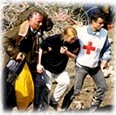|
 Long before you see the black clouds on the horizon,
your family should designate a place in your home to go if a tornado
approaches. A place away from windows is best. In case you don't have
time to make it to the basement, an interior hallway is a wise place
to go. Long before you see the black clouds on the horizon,
your family should designate a place in your home to go if a tornado
approaches. A place away from windows is best. In case you don't have
time to make it to the basement, an interior hallway is a wise place
to go.
When a tornado watch is issued, the American
Red Cross advises people to listen to local television and radio
stations for updates on the weather. A tornado watch is issued when
conditions are favorable for the formation of a tornado. The Red Cross
stresses the importance of keeping aware of the changing weather situation;
the more time you have to move to safety, the more likely you and your
family are to survive unharmed.
A tornado warning presents an immediate threat.
A tornado warning is issued when a tornado is spotted visually or on
weather radar. In case of a tornado warning, the Federal Emergency Management
Agency (FEMA) advises
people to:
- Go at once to the basement, storm cellar, or the
lowest level of the building
- If there is no basement, go to an inner hallway or
a smaller inner room without windows, such as a bathroom or closet
- Get away from the windows
- Go to the center of the room. Stay away from corners
because they tend to attract debris
- Get under a piece of sturdy furniture such as a workbench
or heavy table or desk and hold on to it
- Use your arms to protect your head and neck
- If in a mobile home, get out and find shelter elsewhere.
FEMA stresses the last point, especially. It is very
easy for a mobile home to be overturned in high winds. FEMA suggests
arranging for a safe place to go well ahead of time, such as with a
friend, family member, or a neighbor.
Myths Debunked
There are many myths about what to do during a tornado.
The American Red Cross is hoping to put to rest these fallacies.
One popular belief is that opening a building's windows
allows the air pressure to equalize as a tornado passes overhead. Air
pressure can equalize itself through normal openings within a building
and opening windows doesn't particularly help, especially given the
likelihood of glass breaking due to flying debris. The American Red
Cross stresses that it is much more important to get to safety than
to open windows.
Another persistent myth says that the southwest corner
of a building is the safest. Studies have shown that the safest place
in a building is away from all of the windows regardless of what corner
of the building you're in.
If you're caught outdoors during a tornado, don't
try to outrun it in your car. A tornado can change directions quickly.
You should seek shelter indoors. If that isn't possible, get out of
your car and duck down in the lowest spot you can find, such as a ditch or gully. Because
a tornado doesn't suck objects up, but rather blows them around at speeds
which can easily exceed 300mph, a highway underpass is not
safe since it leaves you exposed to flying debris. During
these devastating storms even the smallest of item caught in its furry
such as small roof shingle parts, glass fragments, wood splinters and
the like are bullets in the wind causing serious or even fatal injuries.
Staying low to avoid this debris is the key to survival if caught outdoors.
down in the lowest spot you can find, such as a ditch or gully. Because
a tornado doesn't suck objects up, but rather blows them around at speeds
which can easily exceed 300mph, a highway underpass is not
safe since it leaves you exposed to flying debris. During
these devastating storms even the smallest of item caught in its furry
such as small roof shingle parts, glass fragments, wood splinters and
the like are bullets in the wind causing serious or even fatal injuries.
Staying low to avoid this debris is the key to survival if caught outdoors.
Here Comes The Sun
Keep
your radio tuned to a local station, too. It may be possible that the
tornado that has passed overhead is one of many tornadoes in
your area.
After the storm has blown over, carefully inspect your
home for damage. The sooner you start the claims process for any damage
that did occur, the quicker you can get started on repairs.
When inspecting your home, be sure to avoid downed power
lines. FEMA warns that just because a power line is down doesn't mean
it can't give you a serious shock.
The American Red Cross mentions that flashlights,
not candles, should be used for inspecting your home because of the
possibility of gas leaks.

Disaster Planning Made Simple
Of course to be deeply affected by a disaster you don't
have to be directly hit by it. Lengthy interruptions in basic
services can catch you off guard. Downed power lines, broken water
and gas mains can threaten your safety even when your home was untouched
and survived an ordeal. For many people, a little preparation
could make a big difference in coping with the aftermath of a severe
earthquake or storm. Disaster-planning experts say people should be
prepared to go without power and most other basic services for up to
72 hours. That means no electricity, water, fire fighters or police.
With a few simple additions, the average household already
has many of the resources needed to deal with a disaster. Here are a
few suggestions and hints on how best to use what's already on hand.
- Water. The water heater (30-40 gallons) should
contain enough water to last a four-person household four days.
(Turn off power before draining and be careful of sediments that can
accumulate at the bottom of the tank.) Ice cubes in the freezer and
liquid from canned food can be used. If you'd rather not store extra
bottles of water, consider keeping purification tablets on hand. Household
chlorine bleach will disinfect water, too. Use one-eighth of a
teaspoon per gallon of water and let stand for 30 minutes before
drinking. Do not use bleach with added soaps or fragrances.
- Food. Most houses have ample food for several days.
Use food in the refrigerator first, then the freezer. Frozen
food will keep up to three days in an unopened freezer. Keeping a
few extra canned goods in the back of the cupboard is always smart.
- First Aid. Most homes have the necessary items to
handle routine accidents. A basic first-aid kit and a book on first
aid should be kept in a central location. It's a good idea to
take a first-aid and CPR course from the Red Cross.
- Fire Extinguishers. Have one or more fire extinguishers
and learn how to use them. Have the extinguisher serviced according
to the manufacturer's instructions.
- Other essentials. Identify your home's utility
shut-off valves and learn how to turn them off. Have at least
one flashlight and a battery-powered radio. Make an evacuation plan
so all family members know several escape routes and where
to meet outside.

Learn More...
Overview
| Understanding The
Basics | Types Of
Insurance | Coverage
Amounts
Choosing A
Policy | Filing
A Claim | Other
Types Of Insurance | Home
Safety Tips
Planning
Concerns | Home
Glossary

Please Note: The
information contained in this Web site is provided solely as a source of
general information and resource. It is a not a statement of
contract and coverage may not apply in all areas or circumstances. For a complete
description of coverages, always read the insurance policy, including
all endorsements.
|

 Long before you see the black clouds on the horizon,
your family should designate a place in your home to go if a tornado
approaches. A place away from windows is best. In case you don't have
time to make it to the basement, an interior hallway is a wise place
to go.
Long before you see the black clouds on the horizon,
your family should designate a place in your home to go if a tornado
approaches. A place away from windows is best. In case you don't have
time to make it to the basement, an interior hallway is a wise place
to go. down in the lowest spot you can find, such as a ditch or gully. Because
a tornado doesn't suck objects up, but rather blows them around at speeds
which can easily exceed 300mph, a highway underpass is not
safe since it leaves you exposed to flying debris. During
these devastating storms even the smallest of item caught in its furry
such as small roof shingle parts, glass fragments, wood splinters and
the like are bullets in the wind causing serious or even fatal injuries.
Staying low to avoid this debris is the key to survival if caught outdoors.
down in the lowest spot you can find, such as a ditch or gully. Because
a tornado doesn't suck objects up, but rather blows them around at speeds
which can easily exceed 300mph, a highway underpass is not
safe since it leaves you exposed to flying debris. During
these devastating storms even the smallest of item caught in its furry
such as small roof shingle parts, glass fragments, wood splinters and
the like are bullets in the wind causing serious or even fatal injuries.
Staying low to avoid this debris is the key to survival if caught outdoors.